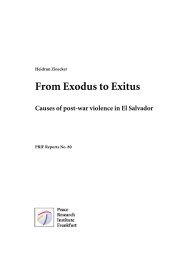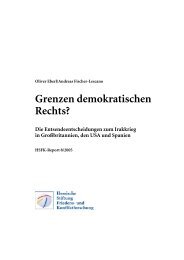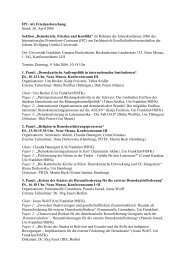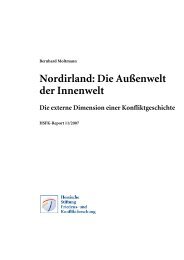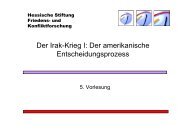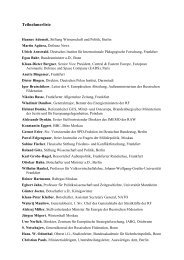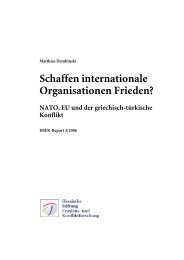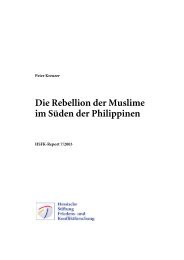The Normative Construction of the Military in Lithuania - HSFK
The Normative Construction of the Military in Lithuania - HSFK
The Normative Construction of the Military in Lithuania - HSFK
Create successful ePaper yourself
Turn your PDF publications into a flip-book with our unique Google optimized e-Paper software.
M<strong>in</strong>iotaite: <strong>Lithuania</strong>n Case I/14-2007<br />
[Russia]. In order to reduce <strong>the</strong> threats latent <strong>in</strong> this economic dependence it is suggested<br />
that strategically vital sectors <strong>of</strong> <strong>the</strong> economy be identified and <strong>the</strong> state be given a<br />
“controll<strong>in</strong>g decision power” over <strong>the</strong>m. <strong>The</strong> prevalence <strong>of</strong> <strong>the</strong> national security<br />
conceptualization is most prom<strong>in</strong>ent <strong>in</strong> <strong>the</strong> way <strong>Lithuania</strong>’s defense policy is def<strong>in</strong>ed.<br />
Both <strong>in</strong> <strong>the</strong> National Security Strategy and <strong>in</strong> <strong>the</strong> Basics <strong>of</strong> National Security national<br />
defense is bound to total and unconditional territorial defense compris<strong>in</strong>g military and<br />
civil resistance components.<br />
On <strong>the</strong> whole, <strong>the</strong> comparison <strong>of</strong> security conceptualizations <strong>in</strong> <strong>the</strong> documents <strong>of</strong><br />
1996 and 2002 shows a certa<strong>in</strong> turn towards <strong>the</strong> concept <strong>of</strong> cooperative security. Yet <strong>the</strong><br />
rema<strong>in</strong><strong>in</strong>g securitization <strong>of</strong> Russia and <strong>the</strong> cont<strong>in</strong>u<strong>in</strong>g attachment to territorial defense<br />
show that national security and defense are conceived as a problem for <strong>the</strong> particular state<br />
ra<strong>the</strong>r than a common or regional concern.<br />
<strong>The</strong> 2005 edition <strong>of</strong> <strong>the</strong> document seeks to avoid this ambiguity. First <strong>of</strong> all, <strong>the</strong><br />
new edition is premised on a more extensive legal basis. <strong>The</strong> Strategy is based on <strong>the</strong><br />
Constitution <strong>of</strong> <strong>the</strong> Republic <strong>of</strong> <strong>Lithuania</strong>, <strong>the</strong> Law on <strong>the</strong> Basics <strong>of</strong> National Security, <strong>the</strong><br />
North Atlantic Treaty and <strong>the</strong> Treaty on European Union (my emphasis - G.M.). As a<br />
member <strong>of</strong> NATO and EU, <strong>Lithuania</strong> perceives its national security as a constituent part<br />
<strong>of</strong> <strong>the</strong> security policy <strong>of</strong> <strong>the</strong>se organizations and refers to <strong>the</strong> analysis <strong>of</strong> threats set out <strong>in</strong><br />
NATO Strategic Concept, <strong>the</strong> Strategy <strong>of</strong> <strong>the</strong> European Union, and o<strong>the</strong>r strategic<br />
documents <strong>of</strong> NATO and EU. <strong>The</strong> def<strong>in</strong>ition <strong>of</strong> <strong>Lithuania</strong>’s security <strong>in</strong>terests now<br />
comprises not only “sovereignty, territorial <strong>in</strong>tegrity and democratic constitutional order<br />
<strong>of</strong> <strong>the</strong> Republic <strong>of</strong> <strong>Lithuania</strong>” but also wider concerns: “global and regional stability”,<br />
“security, democracy and welfare <strong>of</strong> NATO Allies and European Union Member States”,<br />
and “freedom and democracy <strong>in</strong> <strong>the</strong> neighbor<strong>in</strong>g regions <strong>of</strong> <strong>the</strong> European Union”.<br />
In <strong>the</strong> new document, <strong>the</strong> concept <strong>of</strong> military defense is quite radically modified.<br />
First, <strong>the</strong> pr<strong>in</strong>ciple <strong>of</strong> total unconditional defense that pervaded all previous documents is<br />
dropped. More emphasis is laid on <strong>the</strong> pr<strong>in</strong>ciple <strong>of</strong> democratic control <strong>of</strong> <strong>the</strong> armed<br />
forces. <strong>The</strong> pr<strong>in</strong>ciples <strong>of</strong> defense are supplemented with <strong>the</strong> pr<strong>in</strong>ciples <strong>of</strong> “deterrence and<br />
collective defense” and “crisis prevention and stability development”. With <strong>the</strong> pr<strong>in</strong>ciple<br />
<strong>of</strong> total defense gone, <strong>the</strong> idea <strong>of</strong> civil resistance is also dropped. It is replaced by <strong>the</strong><br />
requirement <strong>of</strong> “civil tra<strong>in</strong><strong>in</strong>g” that would help “consolidate democratic and civic values<br />
and to streng<strong>the</strong>n civil society”. <strong>The</strong> law asserts: “Civic tra<strong>in</strong><strong>in</strong>g enhances patriotism,<br />
resolution to defend <strong>the</strong> Homeland, national freedom. Awareness <strong>of</strong> <strong>the</strong> importance <strong>of</strong><br />
national identity and civic tra<strong>in</strong><strong>in</strong>g is a condition <strong>of</strong> ensur<strong>in</strong>g national security”.<br />
2.5. <strong>The</strong> <strong>Military</strong> Defense Strategy (2000, 2004)<br />
<strong>The</strong> surveyed Law on Organization <strong>of</strong> <strong>the</strong> National Defense and <strong>the</strong> <strong>Military</strong> Service<br />
is an expansion on <strong>the</strong> provisions <strong>of</strong> <strong>the</strong> Basics <strong>of</strong> National Security (1996), while <strong>The</strong><br />
<strong>Military</strong> Defense strategy (2000, amended <strong>in</strong> 2004) is a specification <strong>of</strong> <strong>the</strong> provisions <strong>of</strong><br />
<strong>the</strong> National Security Strategy (2002), expressive <strong>of</strong> <strong>Lithuania</strong>’s commitment to collective<br />
defense. <strong>Lithuania</strong> is committed „to participate <strong>in</strong> <strong>in</strong>ternational operations led by NATO,<br />
13



